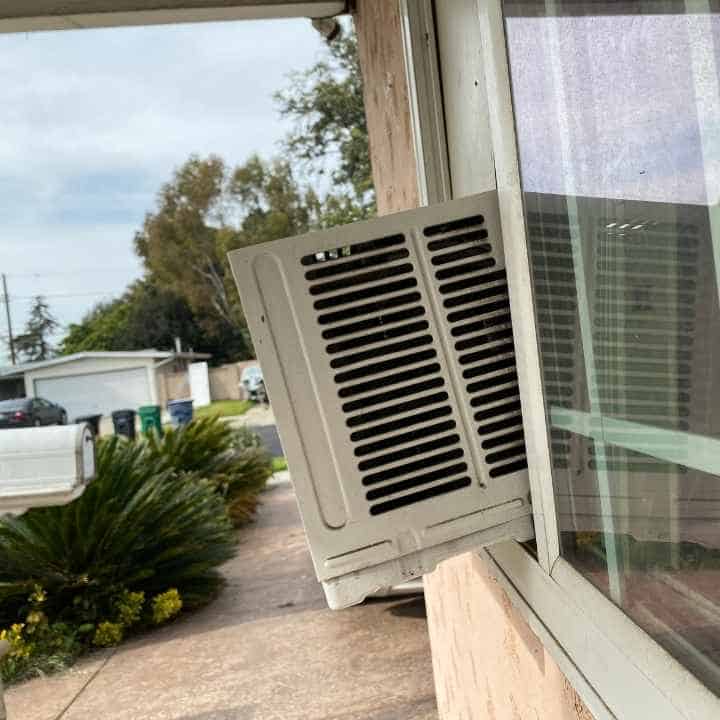Do window air conditioners pull in air from the outside? This is a question that many people have, and the answer is not always clear.
Some experts say that the air conditioner pulls in air from the outside, while others say that it only recirculates indoor air.
To find out which is true, it is important to understand how an air conditioner works.
Do a Window Air Conditioner Pull Air From Outside?
Any mechanical device that transfers heat from one area to another will require a source of cooler air and a destination for hotter air.
An air conditioner is no different. A window air conditioner pulls air outside the window unit and expels the warmer air outside.
Some models have a fan that helps to circulate the cooled air around the room, but the basic principle is still the same – cool air in, warm air out.
The process of pulling air from outside also helps to filter out pollutants and allergens, providing a fresher, cleaner environment inside the home.
Why Does a Window Air Conditioner Need Outside Air?
1. Ventilation
One of the primary reasons window air conditioners require outside air is for proper ventilation. When the air conditioner runs, it cools the indoor air by removing heat and moisture.
This process creates a temperature difference between the indoor and outdoor environments. By allowing outside air to enter the unit, the AC can maintain a balanced airflow and prevent excessive pressure buildup.
2. Heat Exchange
Another crucial aspect is the heat exchange process. Window air conditioners extract heat from the indoor air and release it outside.
The outside air acts as the cooling agent, absorbing the heat from the refrigerant and carrying it away.
With a constant supply of outside air, the heat exchange process would be efficient, reducing cooling performance.
3. Air Quality
Bringing in fresh outside air helps improve the overall air quality inside your space. It allows for better circulation and helps remove pollutants, odors, and stale air.
While window air conditioners may not have advanced air filtration systems like central AC units, the outside air intake can still provide some freshness.
4. Condensation
Window air conditioners produce condensation as a byproduct of the cooling process. This moisture needs to be drained out, and the easiest way to achieve this is by utilizing outside air.
By allowing outside air to enter the unit, the excess moisture can be expelled, preventing any potential water damage or mold growth.
How Does A Window Air Conditioner Work?
A window air conditioner cools your home by circulating the air inside through a cooling coil.
This coil is filled with a refrigerant, which absorbs the heat from the air as it circulates.
The refrigerant is then circulated to the outside unit, where the heat is released into the air.

The cooled air is then circulated back into your home, and the cycle repeats. The thermostat on your air conditioner monitors the temperature in your home and turns the unit on and off to maintain a comfortable temperature.
Your AC unit also filters the air inside your home to remove dust, pollen, and other airborne particles.
The Two Types of Window AC Units
When it comes to window AC units, there are two main types: standalone window systems and portable systems.
Standalone window systems are installed in a single window and usually come with their own set of vents and ductwork.
Portable systems, on the other hand, can be moved from one window to another and are typically less expensive.
Both types have their pros and cons, so it’s important to choose the right one for your needs.
Standalone window systems are generally more energy-efficient than portable units, but they can be more difficult to install.
If you’re not experienced in home improvement projects, it’s best to hire a professional to install your unit.
Portable AC units are easier to install, but they’re not as energy-efficient as standalone units.
Additionally, portable units can be more difficult to keep in place, especially if you have children or pets who like to push them around.
Pricing is also something to consider when choosing between the two types of units. Standalone units are typically more expensive than portable ones, but the initial investment may be worth it in the long run if you plan on using your AC unit frequently.
Does a Window AC Provide Fresh Air?
A window air conditioner is a great way to cool your home during the hot summer months.
However, some people worry that using an AC will cause their home to become stuffy and stagnant.
So, does a window AC provide fresh air? The answer is yes! Here’s how it works: When you turn on your AC, the unit pulls in warm air from outside.
This air is then filtered and cooled before circulating back into your home. As a result, you’re getting fresher air when you use an AC than you would if you left your windows open.
FAQ
Does a window air conditioner draw in outside air?
Window air conditioners draw in outside air to cool the environment inside.
Where do AC units pull air from?
Window air conditioners draw in outside air to cool the environment inside. This air is then filtered and cooled before circulating back into your home.
Do window AC units make allergies worse?
Window AC units do not make allergies worse. The filtered and cooled air that is circulated back into your home helps to remove allergens from the air.
Does a window air conditioner remove humidity?
Window air conditioners do not remove humidity from the air.
Conclusion
Window air conditioners draw in outside air to cool the environment inside. This air is then filtered and cooled before circulating back into your home.
As a result, you’re getting fresher air when you use an AC than you would if you left your windows open. Window AC units do not remove humidity from the air.